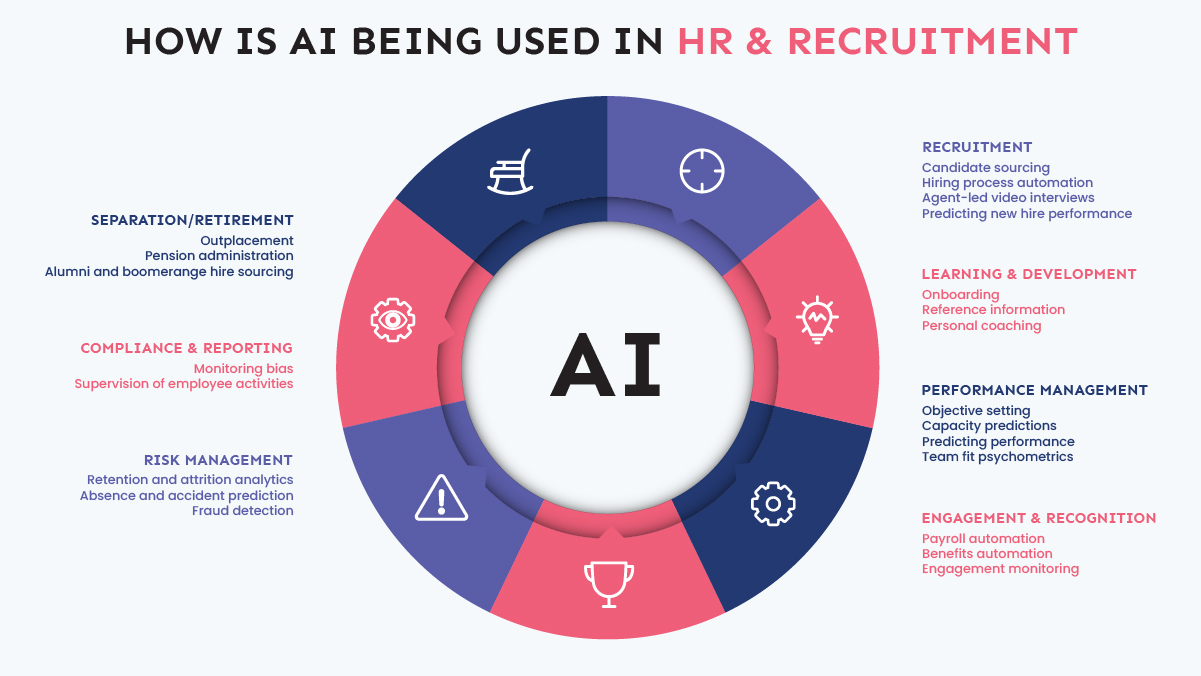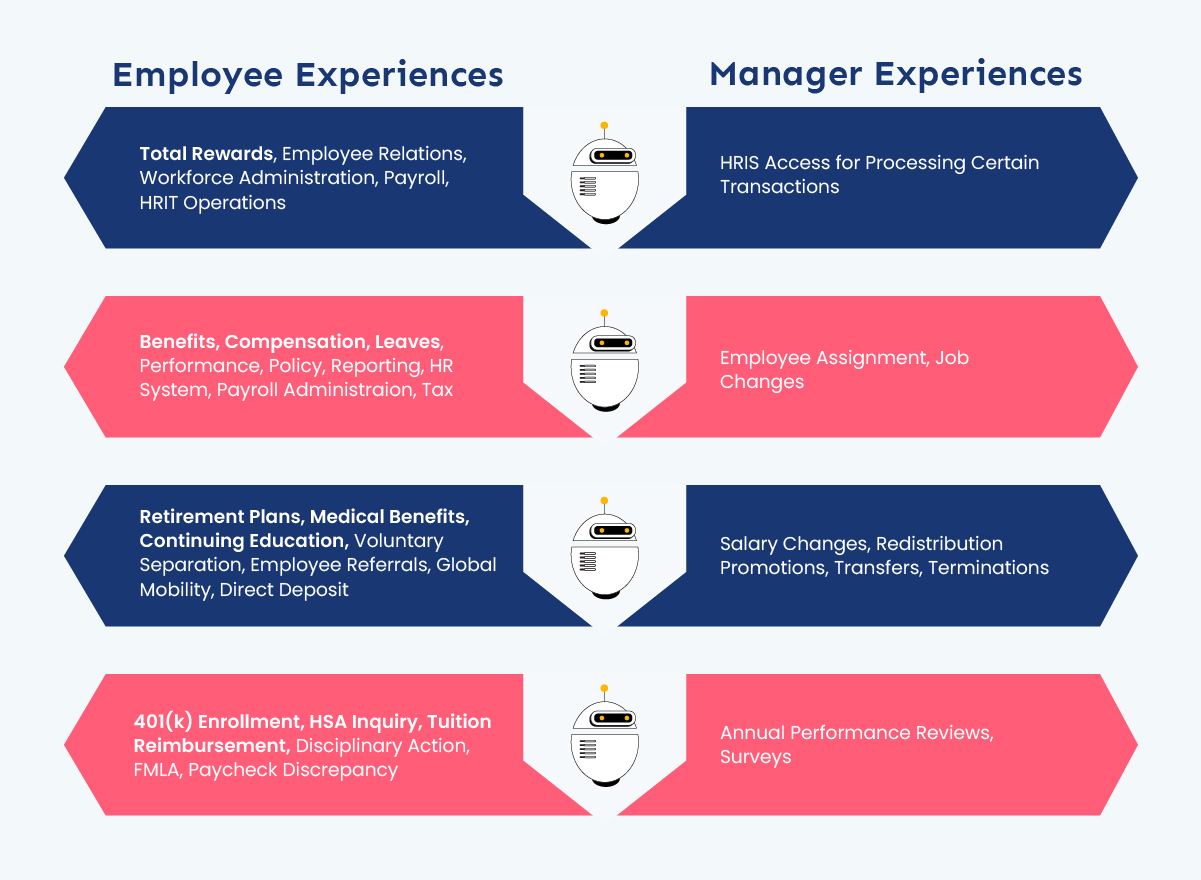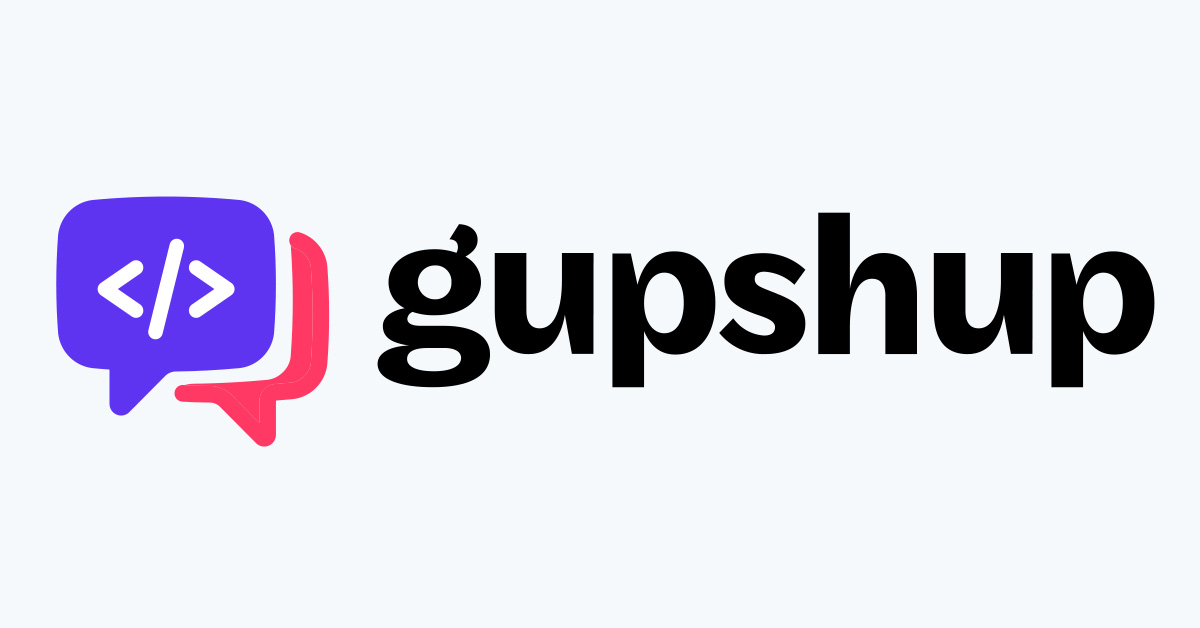4 Ways AI-powered Chatbots Are Redefining Recruitments
Finding a new employee is not an easy task. There are so many applications and so little time. How to make the recruitment process easier, faster, and more effective?
Earlier, a lot of HR agents found a solution in recruitment process automation tools. Instead of going through hundreds or even thousands of CVs manually, HR agents now use tools powered by Artificial Intelligence to filter the documents and dedicate their precious time to only the most relevant ones.
Since bots proved to be so useful, their adoption rate has greatly accelerated. Today, AI is an inseparable element of the recruitment process and workplace dynamics. And now, the field is advancing with the introduction of AI-powered chatbots.
In this post, we will discuss how AI solutions improve the recruitment process and how they can benefit the HR workflow.

What Is An AI-powered Chatbot?
Recruitment chatbots can be found on almost any website these days. Their purpose is to communicate with website visitors, responding to common questions, thus leaving much more time for customer support to deal with specific and urgent issues.
As a very useful communication tool, AI chatbots are widely employed by agency recruiters and HR departments. When used in recruiting, AI robots are there to help screen CVs for certain keywords and collect candidates’ data, while chatbots initiate communication with the interviewees – on websites, as well as via emails and SMS.

Why Use A Chatbot?
The benefits of using AI solutions in HR are multifold.
To begin with, these tools never get tired. They work all day, all week, which is particularly important if you are hiring people from different time zones.
Additionally, highly productive bots cost much less to build than employing human labor. Besides, a growing business will be able to scale up the recruitment process without having to enlarge the hiring team.
Therefore with bots the expenses of training and equipping HR staff drop while ROI grows.
These tools will also provide you with statistics and data analytics that will help you understand your candidates on a much deeper level. In turn, you will be able to make better hiring decisions and constantly improve your overall recruiting process.
Since AI is a master of languages, it will help you communicate with your candidates in more languages than your teammates actually speak.
Although they are becoming more popular every day, AI-powered HR solutions are still a novelty. For now, only 22% of high-performing HR teams use automation, while only 6% of HR agencies with low performance use these tools to help their workflow.
In other words, using AI chatbots is a great way to outperform the competition and impress new employees from the very start.
However, these bots come with some challenges and limitations as well. While they can save you from repetitive tasks, they can’t really do the final interview for you. In the end, you will have to meet the best candidates and make the final decision.
Also, data privacy is a sensitive issue when using AI chatbots. Local data privacy regulations should be taken into full consideration.
Now, without any further delay, let’s see how AI-powered chatbots actually do and how they contribute to improving HR workflow.

HR Chatbots Are Redefining Recruitments
As a company grows, it will need more employees. This is how AI-powered chatbots can help to speed up the hiring process.
1. Screening Through Applications
A significant number of companies adopted some form of applicant tracking system. Due to their efficiency, they are gaining popularity in government institutions as well.
The bots screen the CV files (in PDF, Word, or other formats), looking for certain keywords predefined by the user (i.e., the HR agent). The purpose of keywords is to detect the desirable experience and education in the files.
The algorithm will copy the relevant information from the resumes and automatically store it in the database. Thanks to that feature, as they progress through the hiring stages, there will be no need to ask candidates to provide the information again and again (such as name, phone number, email address, and so on).
In turn, HR agents do their job more easily, and the candidates get feedback much more quickly.
By the way, AI is not limited to bots.
- An AI benchmarking engine can go beyond routine tasks to help evaluate candidates and even predict who will succeed (or not) in your organization by incorporating machine learning and various algorithms for jobs that have quantifiable skills and success rates, such as software developers and other tech experts.
- Conversational AI is a relatively new field that allows you to design AI-assisted dialogues that free your staff to attend to non-routine matters. For example, if you needed to expand rapidly, you might post notices or paid ads on social media for a few days, generating a volume of inquiries that your people couldn’t possibly answer promptly. However, by designing your informational conversation using AI, you could dispense a great deal of information – trained to respond to the inquirer’s questions or comments – that harvests all of those candidates for your evaluation without losing any because of delayed response.
2. Responding To Queries
Another tiring part of the hiring process is answering candidates’ questions. Millennials, the core of the workforce at the moment, are very sensitive to having to wait for information. They prefer getting important information instantly using AI chatbots rather than waiting for an email reply.
Managing frequently asked questions is particularly important for your social media channels. Let’s say you’ve posted a job on LinkedIn and worked on your social media marketing to attract attention. Very soon, you will have to deal with hundreds of messages and queries to respond to.
It is impossible to reply to all those queries at once. But, AI never sleeps, and will reply to all generic questions for you.
Of course, some of those questions will go beyond what a chatbot can provide, and in such cases, HR departments might want to borrow from the hybrid chatbot strategy used by customer support teams. In those cases, the chatbot is the first line of defense, answering common questions, and then backed up by human staff who can answer the more challenging ones. Over time, people can train chatbots to respond even to those more difficult questions..
3. Understanding Employee Referrals
AI solutions can also help your HR department with analyzing referrals. First of all, the algorithm can spot the most successful refers. It does so by tracking the performance data from previous referrals. Thus, it recognizes where the best candidates come from, thus putting candidates with similar referrals to the front in the future.
4. Messaging
Once the list of best applications is composed, the next step is contacting the candidates.
AI tools have many different options to successfully start communication with potential employees:
- SMS
- Video calls
- Interview scheduling
- And more.
Chatbots can automatically message candidates, informing them about job alerts, reminding them of scheduled meetings, or enabling them to answer and ask queries.
Of course, after you’ve filled a job, you’ll still have candidate files on hand. But as time passes, the data becomes less applicable as people’s lives change. Chatbots are ideal agents for candidate re-engagement, reaching out to find out if they’re still on the market and interested in your company.
Other Benefits
The benefits of chatbots don’t stop when a person gets a job. Here is how AI-powered solutions continue assisting HR agents throughout the employee life cycle.
- HR bots for employee onboarding
Once a person is hired, the next step is to help them fit in. This means introducing them to their new teammates, acclimating them to the company culture, and tracking their progress. Clearly, AI tools facilitate the onboarding process by communicating with employees and interacting with other CRM software to help achieve better communication.
- HR bots for scheduling shifts
Now that your staff is onboard, you’ll face the complicated task of making sure they’re all assigned to the right spot at the right time, particularly if you run a restaurant or a business that operates long hours. Once, managers tried to control this with Excel spreadsheets, but that led to a mess as employees called in sick, traded shifts, or worked unauthorized overtime – communications variables that spreadsheets are not good at handling. Modern shift planning is aided by AI-driven communications to keep everything coordinated in real time, and such systems can alert you to shift coverage or cost issues before they become a problem.
- HR bots for employee training
Instead of doing it the old way, with traditional PPT presentations and lectures, AI chatbots can make employee training more interactive and engaging.
- HR bots for benefits enrollment
AI chatbots can help employees enroll for benefits more easily and in a matter of minutes.
- HR bots for company FAQs
Your new employees will be delighted to have 24/7 access to information about important issues such as vacation days, absences, payroll inquiries, etc. Besides, the HR agent will be more than happy not to have to reply to the same questions over and over again.
- HR bots for annual reviews
With AI robots, assessing employees and providing them with feedback using a notebook and a pen will become a thing of the past. Your HR department will have much better insights into qualitative and quantitative aspects of employee performance.
- HR bots for leave requests
Once the employee life cycle comes to an end, AI chatbots can allow employees to create their leave requests and update HR managers with their feedback in real-time.
Are You Ready To Upgrade Your Recruitment Process?
Although they can’t do everything, AI chatbots can significantly help at almost every stage of the employee life cycle. Although they are most helpful with the early stages such as screening through applications, they are great at improving the subsequent communication and candidate reengagement. They will also help HR agents with onboarding, reviewing and, finally, saying goodbye to employees who no longer wish to work for the company.
Automate your recruitment flows with Gupshup. Gupshup, a market leader in messaging on the WhatsApp for Business platform, has acquired RoboRecruiter to fast track its strategy to transform the HR and Recruitment vertical market.
Enable recruitment automations with SMS, WhatsApp and chatbots and manage your processes in real time at 10x speed. #LetsGupshup to know more.


